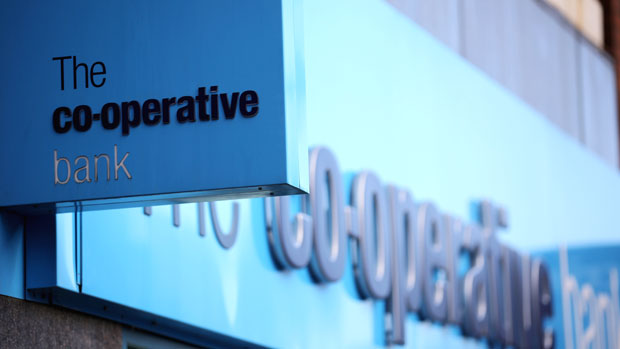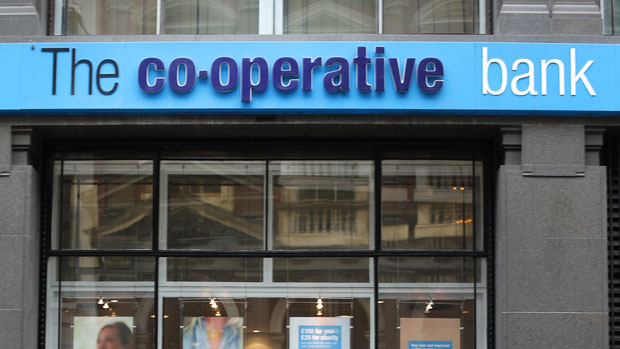Co-op's losses narrow thanks to 'very loyal' customers
Bank boss 'extremely grateful' to current account clients for staying

A free daily email with the biggest news stories of the day – and the best features from TheWeek.com
You are now subscribed
Your newsletter sign-up was successful
Co-operative Bank boss Liam Coleman has praised its "very loyal" customers after it reported only a modest outflow of accounts and narrowing losses in the first half of 2017.
The ethical bank, which was rescued by hedge fund backers for a second time in June, shed 25,000 current accounts between January and June and saw £400m of savings withdrawn, says the BBC.
But Coleman said the current account drop represented less than two per cent of its customer base and that it still had 1.4 million current account customers.
The Week
Escape your echo chamber. Get the facts behind the news, plus analysis from multiple perspectives.

Sign up for The Week's Free Newsletters
From our morning news briefing to a weekly Good News Newsletter, get the best of The Week delivered directly to your inbox.
From our morning news briefing to a weekly Good News Newsletter, get the best of The Week delivered directly to your inbox.
He added: "The vast majority of customers have remained very loyal as we have progressed the sale and capital raise process and I am extremely grateful for their ongoing support."
The bank reported a pre-tax loss of a little more than £135m in the first six months, down from £177m for the same period last year.
Coleman said the customer departures came when the bank was on the brink of collapse and was up for sale, which culminated in a £700m deal in June that has secured the bank's immediate future.
Hedge fund backers put up another £250m of cash and converted £433m of bonds into equity, while retail bondholders took a 55 per cent "haircut" on the value of their holdings, says The Guardian.
A free daily email with the biggest news stories of the day – and the best features from TheWeek.com
As a result, the 20 per cent stake of former owner Co-operative Group will be reduced to around one per cent.
The deal is "on track" to complete next month.
Co-op Bank hopes its ethical principles will continue to be a unique selling point to customers, but getting back to profitability - an aspiration with no deadline - is predicted to involve a large slice of cost-cutting.
In the past six months, the bank has cut ten branches and shed almost 900 staff, boosting the bottom line by around £13m. The Guardian says "further job cuts are likely".
Co-op Bank agrees £700m rescue package
29 June
The Co-operative Bank has secured a last-minute rescue package to stop it being wound up.
Investors from the Co-operative Group, the bank's parent company, who are predominantly US investment funds, have agreed to write off £443m in debt and buy £250m worth of new shares.
In addition, the bank will separate its pension fund, which has £8bn of liabilities, from the group's scheme.
Co-op Bank, which was founded in 1872 and is known for its ethical approach to business, has been struggling for four years after an abortive attempt to buy more than 600 branches from Lloyds revealed a £1.5bn black hole in its finances.
It has been "under intense supervision" by the Bank of England since it put itself up for sale in February, the BBC says, but Wednesday's £700m cash injection "will spare the regulator the job of stepping in to manage its wind-up".
Despite its troubles, the Co-op's customers have proved remarkably loyal. It has kept its nearly four million account holders and mortgage borrowers despite its financial difficulties and a sex and drug scandal involving former chairman Paul Flowers.
Co-op Bank close to raising up to £300m of new funds
20 June
Co-op Bank has said it is in "advanced discussions" with existing investors about a deal that would raise as much as £300m new cash to shore up its balance sheet.
The group, which has been majority owned by hedge funds since 2013, has been searching for a new financial settlement since February, after revealing it would fall short of the Bank of England's minimum capital requirements.
That means it was likely to fall short of the minimum amount of capital it needed to hold relative to its lending activities.
Bosses have been running a sales process over the past four months, while also talking to current backers about both putting in fresh cash and also exchanging debt bonds for equity.
Bankers briefed on the plan told the Financial Times bondholders would be encouraged to swap around £450m of bonds, immediately and positively boosting the bank's equity-to-debt ratio.
It would also seek to raise around £250m to £300m in new equity.
Former parent company Co-op Group's current stake of around 20 per cent in the unit will "drop towards zero" unless it decides to back the new fundraising to the tune of "millions of pounds", says The Guardian.
The group wrote down the investment to zero in April and it is considered probable that all of the new cash would come from hedge funds.
"Meanwhile, the bank said that as well as exploring potential recapitalisation it was also proceeding with its sale process," says the BBC.
Co-op Bank has made losses in each of the last five years, with the deficit falling from £610m in 2015 to £477m last year.
'Worthless' Co-op Bank receives rescue takeover offers
7 April
Troubled Co-op Bank, declared "worthless" by its former-parent-turned-minority-backer Co-op Group this week, has attracted the interest of several potential new owners.
The lender, which was put up for sale by its hedge-fund owners in February, said it had received "a number of non-binding proposals" and had selected "several parties" with which to continue talks, says the BBC.
Bidders are thought to include Sir Richard Branson's Virgin Money and CYBG, the owner of Clydesdale Bank and Yorkshire Bank, adds the Daily Telegraph.
CYBG missed out on buying the Williams & Glyn spin-off unit from Royal Bank of Scotland this year, when the state-backed bank put forward a plan to hang on to the business and appease a European Commission divestment demand in other ways.
TSB, One Savings Bank and the specialist mortgage lender Paragon previously sounded their interest in buying Co-op.
Co-op reiterated that it is continuing to examine an alternative to a sale in the form of an investor fundraising, which might need to reach as much as £750m.
A key question will be the scale of the takeover offers. When Co-op Group wrote the bank down to nothing this week, The Guardian said the entire business could be worth just £45m.
It is also thought any sale "could see bidders snap up parts of the bank rather than the whole business", says the Telegraph.
Co-op Bank had to be rescued by a consortium of hedge funds after nearly collapsing in 2013, in a deal that saw Co-op Group's stake reduced to 20 per cent.
It has continued to struggle, however, and this week Co-op wrote down its shareholding, which had been worth £185m, to zero. That was enough to push Co-op Group to a £132m loss, despite underlying profits rising 32 per cent.
Co-op Group posts first loss in three years after bank write-off
6 April
Mutual registers overall loss of £130m, but underlying profits jumped to £146m
Co-operative Group is heralding "stellar progress" in its annual results despite posting its first loss since the wider group almost collapsed in 2013.
It posted an overall loss of £132m for 2016, mostly the result of a complete write-off of its remaining stake in Co-op Bank.
At one time, that stake, acquired when the bank had to be bailed out to avoid collapse, was worth £185m, says the BBC.
It had already been downgraded twice in the past year, adds The Guardian, and the shareholding has now been revised to zero since Co-op Bank was put up for sale in February.
An update on the sale process is due this week and it is thought the business overall could be worth as little as £45m.
Aside from the troubled banking unit, the BBC says the mutual incurred "financing costs" of £47m last year.
But in general, underlying profits, excluding the banking interest, jumped 32 per cent to £148m as revenues across the wider group rose three per cent to £9.5bn.
"We have made pretty stellar progress," said chairman Allan Leighton.
Co-op's core food stores, funeral homes and insurance businesses all gained customers and market share in the past year and it has said it will explore entering other markets.
"Retail analysts are speculating that could mean an entry into the electricity and gas business," says the BBC.
Co-op Bank faces 'break-up' as buyers circle
15 February
A sales process kick-started for Co-operative Bank could yet see the bank broken up, says The Times.
So far TSB, One Savings Bank and the specialist mortgage lender Paragon, which is backed by huge funds and private equity firms, have shown interest in the bank, although not necessarily in buying the whole business.
Clydesdale and Yorkshire Bank owner CYBG may also be interested, reckons the Times, as a "consolation prize… if it does not win Williams & Glyn, which is being sold by Royal Bank of Scotland".
Co-op Bank was bailed out by hedge funds in 2013 and is now only 20 per cent owned by its former parent company, the Co-operative Group.
A turnaround plan that includes reducing the bank's branch network from 294 to 105 outlets has failed to sufficiently improve the troubled lender's finances. Co-op Bank is now seeking fresh capital to meet minimum regulatory requirements.
The bank is already likely to "bail in" bondholders worth £450m and convert their assets into equity, but on top of this it will still need another £200m to £300m – and may need to target a total injection of £1bn, says the Times.
A credible buyer for the whole business is TSB, which was spun out of Lloyds Banking Group in 2014 and is now owned by the Spanish group Sabadell. Yesterday TSB announced that it might be interested if the "price is right".
TSB currently has over 600 branches and wants to increase this figure.
It has also bid on a £16bn portfolio of Bradford and Bingley (B&B) mortgages, so will not be put off by a £3bn loan book Co-op acquired from Britannia Building Society in 2009.
Another prospective buyer for the whole business – and the preferred option – is Clydesdale, which has made no public comment.
In addition to these two is Paragon, a buy-to-let lender that along with a consortium of investors is in negotiations to buy the B&B book. Sources have told the Financial Times it is interested in the Co-op's mortgage loans.
Another bank which has expressed interest only in the mortgage book is One Savings Bank, the small lender set up by the private equity house JC Flowers.
The Times says a deadline for the deal is likely to be this summer as Co-op Bank has to repay a £400m senior bond in September.
TSB early frontrunner to buy Co-op Bank
13 February
TSB has emerged as an early favourite to acquire Co-operative Bank, which has put itself up for sale after failing to secure its finances.
The Co-op has four million customers and bosses say its ethical standpoint make it "a strong franchise with significant potential".
It has been majority-owned by hedge funds since 2013, when it was bailed out to the tune of £1.5bn in a deal that saw Co-operative Group's shareholding reduced to 20 per cent.
However, despite its new owners instigating a turnaround plan, the bank has "not been able to strengthen its finances because of low interest rates", says the BBC.
Consequently, it is "commencing a sale process, alongside other options" in order to meet its regulatory capital requirements, adds Sky News.
BBC business editor Simon Jack says: "One buyer suggests itself: TSB, which was carved out of Lloyds [in 2014] to satisfy competition concerns over the scale of the Lloyds/HBOS merger".
He continues: "With 600 branches, [TSB] lacks the scale to compete against the Big Five and it has a very strong capital position with no legacy issues.
"Whether the bank would want to take on the problems of Co-op is questionable but it terms of brand (both have a local and ethical flavour to them) it might work."
TSB itself confirmed to the broadcaster that while it is currently focused on completing the separation of its IT systems from Lloyds, it would be interested in the Co-op "if the price was right".
Sky cites the Co-op's "disastrous merger" with the Britannia Building Society in 2009, which "ballooned" its balance sheet, as the major cause of its problems.
Added to that, the bank was also hit by allegations of serious mismanagement after reporting a loss of £2.1bn in March 2013, with claims it had been led for many years by chief executives and chairmen with little to no banking experience.
-
 The broken water companies failing England and Wales
The broken water companies failing England and WalesExplainer With rising bills, deteriorating river health and a lack of investment, regulators face an uphill battle to stabilise the industry
-
 A thrilling foodie city in northern Japan
A thrilling foodie city in northern JapanThe Week Recommends The food scene here is ‘unspoilt’ and ‘fun’
-
 Are AI bots conspiring against us?
Are AI bots conspiring against us?Talking Point Moltbook, the AI social network where humans are banned, may be the tip of the iceberg
-
 Has the Co-op Bank secured its future?
Has the Co-op Bank secured its future?In Depth It might sound like history repeating itself, but a fresh hedge fund deal could be the start of a new era
-
 Co-op Group: urgent reform needed to avoid ‘grave harm’
Co-op Group: urgent reform needed to avoid ‘grave harm’Speed Read Governance structure at the Co-op has ‘lamentably failed’, says former City minister Lord Myners
-
 Is the Co-op Bank heading for a merger?
Is the Co-op Bank heading for a merger?In Depth Boss admits stockmarket listing is some way off as losses likely to continue for two years
-
 Co-op Bank 'sorry' for £1.3bn loss and £400m black hole
Co-op Bank 'sorry' for £1.3bn loss and £400m black holeSpeed Read The head of the crisis-hit Co-op Bank was paid £1.7m for six months' work in 2013
-
 Euan Sutherland resigns from 'ungovernable' Co-op Group
Euan Sutherland resigns from 'ungovernable' Co-op GroupSpeed Read Chief executive Euan Sutherland has stepped down, blaming a lack of ‘professional and commercial governance.